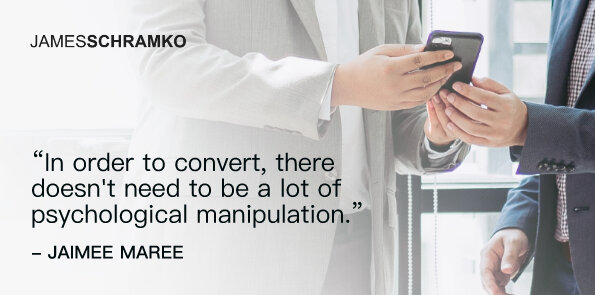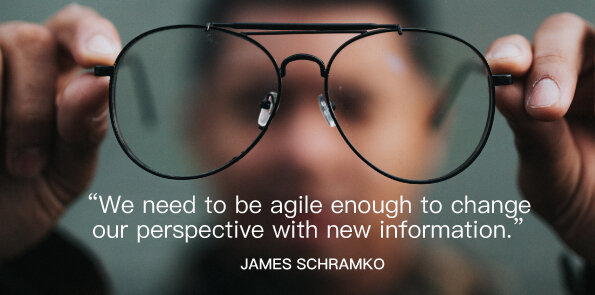Podcast: Download (Duration: 40:18 — )
Get Notified Of Future Episodes Apple Podcasts | Spotify | Amazon Music | Android | Blubrry | Gaana | TuneIn | Deezer | Anghami | RSS | More
Copywriting has been a recurring theme on the show, represented from the very first episode by such guests such as John Carlton.
Today’s guest is Savvy Copy’s Jaimee Maree, a longtime member of James’s community and a direct response copywriter whose past clients include Gary Goldstein, Sylvester Stallone, Tony Robbins and Bill Zanker.
Jaimee will share the influences behind her empathy-driven approach to writing sales copy.
She’ll talk about books like SPIN Selling that shaped her marketing style.
And you’ll come away with one of her best copywriting tips for producing high-converting copy.
Table of contents:
1. What makes copy so important?
2. Before Jaimee had an agency…
3. The people who shaped the journey
4. Choosing to focus on copy
5. What sets Jaimee’s marketing apart
6. The books that influenced a winning style of copy
7. Does AI change the playing field?
8. The trouble with relying on AI
9. The main takeaway…
What makes copy so important?
What makes copy such an important topic that it turns up again and again on a business show? James is interested in Jaimee’s take.
From her perspective as a digital marketer, Jaimee can say copywriting has played a critical role in all aspects of her work, massively impacting the conversions they would get for customers.
It really is salesmanship in print, says Jaimee, requiring both sales skills and a good understanding of psychology.
Jaimee recognized that without well-crafted copy, businesses were unlikely to achieve their desired results, and this inspired her to create Savvy Copy.
Hiring a professional copywriter, says James, was one of his biggest and most rewarding investments. He stresses that good copywriting calls for extensive research, a deep understanding of the product, and communication with clients, with the aim to create persuasive, authentic, and ethical content.
Before Jaimee had an agency…
Jaimee Maree’s online journey started in 2010 with blogging, pay per click SEO, and learning how to rank websites. All this took off when she mastered the skills and started selling advertising space on ranked websites.
Although she’d built in the process a six-figure business, Jaimee felt vulnerable having all her eggs in the Google basket. Jame’s OwnTheRacecourse principle, which she’d learned in 2011, prompted her to begin building and ranking websites for others.
In 2012, Jaimee’s business was struck by the Google Penguin update. This was a setback she believes could have been avoided, had she joined James’s community earlier.
Jaimee spent the next seven or eight years on her digital agency, building websites, running ads, video marketing, and doing a bit of copywriting, gradually expanding her skills and services.
The people who shaped the journey
Reflecting on the past 12 years, Jaimee credits the influence of James’s community for her success. She has a lot of gratitude for the people she met through the membership, asserting she wouldn’t be where she is today without them.
A pivotal point in her journey was when Greg Merrilees of studio1design.com contacted her. Feeling burnt out in the agency, Jaimee was approached by Greg to use her copywriting skills for a high-profile client, Bill Zanker, who was working with Tony Robbins and Pitbull.
The successful overhaul of their underperforming campaign, resulting in unprecedented conversion rates, was an eye-opener for Jaimee. It helped her realize her potential and led her to reshape her business focus.
Choosing to focus on copy
The job with Greg reinforced in Jaimee’s mind the power of effective copywriting, and the need to communicate a product or service compellingly. It also triggered her decision to specialize in copy and help business owners achieve an impactful connection with their audiences.
Jaimee recognized her extensive experience in digital marketing gave her a unique perspective and advantage in the copywriting field. With a fascination with psychology and her ability to infuse it into her work, plus a strong network of connections, she felt certain this was the right path for her.
What sets Jaimee’s marketing apart
In his business, James has never been big on sexy launches or hyped-up marketing, and he feels Jaimee has much the same mindset.
Jaimee asserts that her marketing doesn’t rely on salesy or sleazy tactics, but instead is rooted in empathy, authenticity, and a deep understanding of her audience. She believes the key to conversion lies in demonstrating authority while working on certain psychological principles.
Jaimee feels this approach, which she’s used for a long time, has seen a shift in its acceptance and application, especially after COVID-19.
Since the pandemic, people have become more selective about where they spend their money, with a significant focus on businesses’ values and principles. And in response, businesses have started to work more on authenticity and relatability in their messaging.
Marketing strategies that rely on hard-selling or manipulative tactics are generally no longer effective, Jaimee believes.
James recalls when he first came online – the pushy and obnoxious marketing styles in practice then did not sit well with him. He believes the longevity of his business model, focusing on community, podcasts, and events, demonstrates the effectiveness of playing the long game and promoting authentic practices.
The books that influenced a winning style of copy
James is curious as to the resources that informed Jaimee’s style of copy.
Jaimee obligingly shares three books that have shaped her unique style of copywriting: Building a StoryBrand by Donald Miller, SPIN Selling by Neil Rackham, and Influence by Robert Cialdini. These books, she says, provide the necessary fundamentals and frameworks for creating high-converting copy.
From Building a StoryBrand, she learned the importance of storytelling, with elements such as
1. The hero – This is always the customer, never you.
2. The guide – This is your role, to guide the hero to a solution.
3. The villain – The internal and external problems that exist for our client, and that we need to kill or overcome.
4. The plan – What you intend to do to solve the hero’s problem.
5. The call to actions that must be included.
6. Failure – What it means and how to avoid it.
7. Success.
With SPIN Selling, Jaimee utilizes the principles of
1. Situation – Understanding where the customer is at.
2. Problem – pinpointing the issues they face.
3. Implication – What will happen if the problems are not addressed.
4. Need-Payoff – Why your solution is worth it.
The combination of StoryBrand and SPIN Selling provides a more nuanced and customer-focused approach to marketing and sales.
Finally, Jaimee incorporates the principles from Influence by Robert Cialdini into her copywriting strategy. These include authority, social proof, and liking, among others, which are used to positively influence a customer’s actions and decisions.
By combining the principles from these three books, Jaimee is able to create a unique, authentic, and high-converting style of copywriting.
Does AI change the playing field?
To James’s mind, they can’t have this podcast conversation without talking about AI. It’s been tackled on the show before, also in the context of copywriting.
Some believe AI has advanced to a point where it can replace basic copywriters. James also notes, however, that the tools can be very useful to those with a good grasp of context and an ability to refine AI-generated content.
Jaimee agrees that AI may impact lower-level copywriting. It has its limitations, though, particularly its lack of genuine empathy – and empathy, says Jaimee, is crucial to the sales process.
Jaimee has further reservations about AI, that it could stifle creativity in the copywriting process. AI-generated content, she says, might restrict a copywriter’s unique, creative inputs by providing a starting point that could be difficult to deviate from.
She also warns about potential harm to brands that overuse AI for their content generation, as she believes the tech is not yet sophisticated enough for high-quality sales copywriting.
Nonetheless, Jaimee acknowledges AI’s potential in areas such as idea generation and split testing.
James likens AI to using pre-made ingredients in cooking, implying that the final product may lack the “special sauce” of creativity and originality. He also raises concerns about intellectual property issues and the potential for generic, indistinguishable content.
James does, however, recognize the significant effect AI will likely have on the future, comparing its importance to the advent of the internet. He’s also had positive experiences using AI for gap analysis, style changes, and as a creative tool for drafting speeches and advertisements.
The trouble with relying on AI
One of the biggest limitations of AI, says James, is its lack of contextual understanding. He gives an example where AI was used to create a business plan, resulting in a product that missed important aspects of the user’s business and lacked crucial context.
James says that without sufficient understanding or experience, an AI tool might produce inadequate results, and users wouldn’t know the difference. Moreover, an AI tool is only as good as the questions asked of it, meaning its effectiveness greatly depends on the user’s skill and knowledge.
Jaimee poses a business coach scenario, arguing that trying to fast-track processes with AI could lead to harmful results. Taking the wrong advice from AI, without the discernment that a human coach would have, could potentially set a business on the wrong path, costing time and valuable resources.
James and Jaimee agree: human involvement is important. The rich, empathetic, and creative interactions between humans remain valuable and irreplaceable, even as AI continues to evolve.
They’re all for using AI for tasks such as idea generation, but advise against completely replacing human input, especially in areas that need critical understanding and empathy. Successful marketing still largely depends on the unique touch of human copywriters.
The main takeaway…
What would Jaimee like people to retain from this episode?
The most important and overlooked thing in copywriting, Jaimee believes, is to truly understand your audience. She insists that knowing your client and your client’s clients intimately is vital, as deep connection stems from a genuine knowledge of your audience.
Empathy and authenticity, says Jaimee, crafts the best copy.
If you’d like Jaimee’s expert help with your copy, her site is savvycopy.com.
Liked the show? Leave us a review on iTunes











Leave a Reply